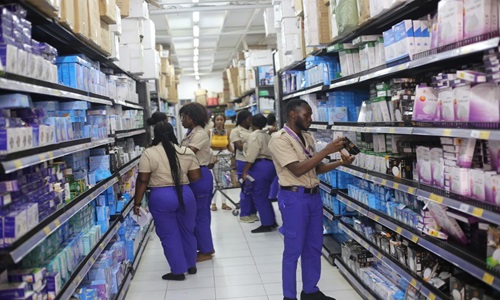Trading Standards Inspectors key to economy
They conduct extensive investigations, collaborate with law enforcement agencies, and seize counterfeit products found in the market.
In any thriving economy, consumer protection and fair trade practices play a vital role in fostering trust, promoting business growth, and safeguarding the interests of both consumers and businesses.
In Ghana, the Trading Standards Inspectors have emerged as key players in ensuring a sanitized and transparent economic environment. This article aims to shed light on the significant impact these inspectors have had in sanitizing the Ghanaian economy, protecting consumers, and promoting fair trade practices.
1. Ensuring Compliance with Regulations:
Trading Standards Inspectors are responsible for monitoring and enforcing regulations and codes of practice that protect consumers and ensure fair competition. They conduct regular inspections of businesses across various sectors, including retail, manufacturing, and services.
During these inspections, they check for compliance with quality standards, labelling requirements, and fair pricing practices. By actively monitoring businesses, Trading Standards Inspectors prevent the sale of substandard goods, deceptive packaging, and unfair pricing practices. Their efforts contribute to a sanitized economy by maintaining a level playing field for businesses and fostering consumer trust.
2. Curbing Counterfeit Trade:
Counterfeit products not only undermine consumer confidence but also harm legitimate businesses. Trading Standards Inspectors play a critical role in combating the production and distribution of counterfeit goods in Ghana.
They conduct extensive investigations, collaborate with law enforcement agencies, and seize counterfeit products found in the market. By curbing counterfeit trade, these inspectors protect consumers from potentially harmful or ineffective products while safeguarding the interests of genuine manufacturers. This contributes to a cleaner and safer business environment, promoting both consumer trust and business growth.
3. Consumer Education and Empowerment:
Trading Standards Inspectors understand the importance of consumer education in promoting fair trade practices. They organize workshops, campaigns, and public awareness programs to educate consumers about their rights and responsibilities. Through these initiatives, consumers learn to identify genuine products, recognize misleading advertising, and make informed purchasing decisions.
By empowering consumers with knowledge, Trading Standards Inspectors foster transparency in the marketplace, discourage fraudulent practices, and promote fair competition. This ultimately leads to a more informed consumer base and a healthier economy.
4. Resolving Consumer Complaints:
One of the key roles of Trading Standards Inspectors is to handle consumer complaints and disputes. They provide a platform for consumers to voice their grievances against businesses that violate regulations or engage in unfair practices.
Trading Standards Inspectors investigate these complaints, mediate between the parties involved, and work towards a fair resolution. By addressing consumer complaints, these inspectors not only protect individual consumers but also send a clear message to businesses regarding the consequences of non-compliance. This encourages businesses to maintain high standards, provide quality products and services, and prioritize customer satisfaction.
5. Supporting Business Growth:
Effective Trading Standards Inspectors contribute to a conducive environment for business growth. By enforcing fair trade practices and regulations, they ensure that all businesses operate on a level playing field.
This prevents unethical practices such as price fixing, false advertising, and unfair competition. When businesses know that these inspectors are actively monitoring and enforcing regulations, they are more likely to invest in quality, innovation, and customer satisfaction.
This fosters healthy competition, encourages business growth, and attracts foreign investment, ultimately contributing to the overall development of the Ghanaian economy.
Conclusion:
Trading Standards Inspectors in Ghana have a significant impact on sanitizing the economy. Their diligent enforcement of regulations, crackdown on counterfeit trade, consumer education efforts, resolution of complaints, and support for fair competition all contribute to a cleaner and more transparent business environment.
By promoting consumer confidence, protecting businesses from unfair practices, and fostering economic growth, Trading Standards Inspectors play a vital role in ensuring a thriving and sanitized Ghanaian economy.
Source: Kofi Yeboah Debrah; the Acting Head of Public Relations at the Ghana Standards Authority


